For the first time we have an Almost Upset double dip! In the 1993 playoffs, the Houston Rockets barely squeezed by the #7 seed Los Angeles Clippers.
As Houston was struggling to put the Clippers down, the #1 seed Phoenix Suns were nearly beaten—indeed almost swept!—by the Los Angeles Lakers. Top-seeded teams have lost in the first round, but never have they been swept. And the ballyhooed Suns nearly achieved this ignominious (de)feat.
Before we get the blow-by-blow rundown, let’s first see how the Showtime Lakers of the 1980s became a club that fell behind the Clippers in the standings. Then we also gotta see how the Suns became ballyhooed darlings in the first place.
SHOWTIME’S OVER?
There’s really only one place to begin with how the Lakers went from NBA finalist in 1991 to 8th seed in 1993.
In early November 1991, 32-year-old Magic Johnson announced to the world that he was infected with HIV. The stunning news abruptly halted an obviously great career and put the Lakers on their heels. Just two years earlier Kareem Abdul-Jabbar had finally done the unthinkable and retired after 20 years. Now Showtime was without its other main pillar.
The Lakers’ cubard wasn’t completely barren. You don’t make the NBA Finals on the completely on the strength of one man… unless you’re the 2007 Cleveland Cavaliers.
James Worthy was ostensibly still in his prime. Supporting players like Byron Scott, Sam Perkins, A.C. Green, and Vlade Divac were still around. Second-year big man Elden Campbell held promise. Presciently, the Lakers had acquired guard Sedale Threatt from Seattle in October ‘91.
So, a good team, but without an engine like Magic Johnson, they weren’t great. And Worthy and Divac missing large chunks of the 1991-92 season due to injury certainly didn’t help. The Lakers finished the ‘92 season 43-39. They were handily beaten by the #1 seed Portland Trail Blazers in the playoffs.
Caught off guard by Magic’s retirement prior to the 1992 season, the Lakers had no illusions about the 1992-93 campaign. A rebuild was in order, but it wouldn’t happen overnight.
(Although, ultimately, it did happen very quickly to everyone’s delight. Stay tuned for the article’s coda.)
Perkins was traded in February 1993 to Seattle for the highly-esteemed Benoit Benjamin and an extremely young Doug Christie. With Byron Scott looming as a free agent after the 1993 season, the Lakers wisely used their 15th overall draft pick in the 1992 draft to select sharpshooter Anthony Peeler. As it turned out, Scott indeed left as an unrestricted free agent signing with the Indiana Pacers in the summer of ‘93. Longtime forward A.C. Green did the same, but with the Phoenix Suns.
Worthy was allowed the dignity of retiring as a Laker, but his decline hit like a ton of bricks. After a robust 19.9 PPG in 39.0 MPG in 1992, Worthy saw his minutes plummet to 28.8 per game in 1993. Given the reduction in playing time, he still averaged a healthy 14.9 PPG, but he wasn’t going to lug this franchise on his back. Not at the age of 31 and with a gimpy left knee.
Still, the 1993 Lakers finished with a 39-43 record. This rebuilding team on the fly still had too much competency, and perhaps too much pride, to completely collapse.
Divac played all 82 games that year averaging 12.8 PPG, 8.9 RPG, 2.8 APG, 1.7 BPG, and 1.6 SPG. Threatt was also a regular season Iron Man playing all 82 games as he produced 15.1 PPG, 6.9 APG, and 1.7 SPG.
These dudes didn’t have title expectations anymore, but they weren’t going to quit on you.
VALLEY OF BALLYHOO
So, the Lakers were crashing off a decade of championship-induced highs, but they had that championship success.
The Phoenix Suns actually had drug-induced highs during the 1980s (another story for another day), hadn’t made the Finals since 1976, and were perennially the almost there team in the late 1980s and early 1990s
Behind a dynamic young backcourt of Kevin Johnson and Jeff Hornacek and the high-powered scoring of forwards Eddie Johnson and Tom Chambers, the Suns racked up 55 wins in 1989 and reached the Western Conference Finals, where they lost to the Lakers.
In 1990, they won 54 games and again reached the WCF where they lost a heartbreaking series to Portland in six games. They lost Game 1 by two points and Game 2 by one point. And for good measure, Game 6 was lost by just three points. Gotta hurt since Phoenix’s two wins in the series came by a combined 46 points.
1991 saw another 55-win season and 1992 a 53-win campaign, but neither season did Phoenix reach the WCF let alone the NBA Finals. Chambers was on the decline at power forward, but the Suns still had KJ in his prime as well as rising Dan Majerle at shooting guard. Sounds like a shakeup was in order and fortunately for Phoenix, there was a disgruntled forward in Philadelphia.
In June of 1992, the Suns packaged Hornacek, Tim Perry, and Andrew Lang together for shipment to the 76ers in exchange for Charles Barkley. The Suns won a franchise record of 62 games for the 1992-93 season and Barkley was obviously a major factor. He was understandably voted the NBA’s MVP that season.
But the upswing was more than just Sir Charles showing up. The Suns had done well to buttress their bench over the years.
Majerle was ready to step in as starting two-guard when Hornacek was traded. Thunder Dan had even made the All-Star team in 1992 despite being the Suns’ Sixth Man. Furthermore, second-year forward Cedric Ceballos came in ready to score at a moment’s notice (12.8 PPG, .576 FG% in just 21.7 MPG). The Suns found a second round gem in forward Richard Dumas, who was a sensation… whenever he wasn’t suspended for drugs, which unfortunately was too often.
The team also signed veteran shooter Danny Ainge for more help in the backcout after ditching Hornacek. Lastly, rookie center Oliver Miller was spectacular in limited action: 5.6 PPG, 4.9 RPG, 2.1 APG, 1.8 BPG in just 19 minutes a night.
This team was stacked and would finally make the NBA Finals… where in true Phoenix style they were defeated by the Chicago Bulls in heartbreaking fashion.
Yet here they are in Almost Upset because they struggled to handle the declining Lakers.
GAME 1: LAKERS 107 — SUNS 103
Holy crap did Sedale Threatt torch the Suns. And it was a mid-range assassination. He shot 17-24 from the field for 35 points and by my count all but three (maybe four) of his makes were about 15-to-20 feet from the basket.
This was classic en fuego Sedale. He would shimmy and spin like Earl Monroe to get his defender off balance and launch these absurd jumpers that were often still contested. But the contest was an illusion. All he needed was the slight separation and that’s what he got this game. Just mesmerizing to watch.
Although Charles Barkley found it rather irksome.
Aiding Threatt was Byron Scott. The veteran was fire from mid-range as well (6-11) but was also money from the foul line (9-11) as he finished with 22 points. It was a good thing he made his freebies because the rest of the Lakers were 7-14 from the charity stripe.
For Phoenix, Charles Barkley was to the interior what Threatt was for the Lakers from the outside. Chuck just burrowed his way to oodles of offensive rebounds (eight) and posted up for indefensible position as he shot 12-16 from the field. He was also hacked a lot shooting 10-15 from the free throw line. 34 points and 15 rebounds total for the power forward.
And like Threatt, Barkley got help from a vet of similar position. Tom Chambers came off the bench to swish away seven of his 11 FGAs while also sinking all four of his free throws. Chambers’ 18 points and five rebounds were the best help Barkley got all night, though.
Dan Majerle and Danny Ainge sucked with a combined 1-11 shooting performance from downtown. Really only Mark West and Negele Knight (who?) were satisfactory in their play. And Knight was only out there because Kevin Johnson missed the game with injury.
Outside of James Worthy, every Laker can be said to have had a good night. And even the elderly Worthy (4-15 FGs) chipped in five boards and four assists. He also had a flashback moment dropping one his statuesque fastbreak dunks in the final minute of action to tie the game at 103 setting LA up for the walk-off win.
The dunk came courtesy of some hustling defense by Vlade Divac. The Serbian center was saddled with foul trouble for long stretches, but still produced 12 points, 10 rebounds, and six assists. A.C. Green was monstrously competent. Rookie Doug Christie got eight minutes of action and managed to find a block, a steal, and a stupendous dunk in the limited run. Even 37-year-old James Edwards—with just five minutes to his credit—managed to hit one of his impossible fading Buddha jumpers.
Even Chick Hearn left a dead body in Phoenix…

Concluding this shocker for Phoenix was the fact that they had erased an 11-point Laker lead and held a 103-98 edge with 2:32 left in the game after Chambers hit a 12-footer as he floated out of bounds. Nonetheless, Los Angeles ended this game on a 9-0 run to stun the Suns. Yikes.
It was a fun game all the way through. Highly recommended watch!
GAME 2: LAKERS 86 — SUNS 81
Maybe if we slow the pace down plus add All-Star Kevin Johnson we can stop these dudes? Well, nope. Not at all. Sorry, Phoenix.
Now let’s do give KJ some kudos in this game. He had 14 points and 16 assists. He also helped hold down Threatt. After 35 points in Game 1, Sedale had just nine points on 4-14 FGs and he never again threatened Phoenix like he did in the opener.
Threatt’s shooting woes were generally shared by players on both teams. The Lakers took matters to another level, though, and made just 10 of their 23 free throws.
Actually let’s pause here to appreciate just how horrible both teams were at freebies this entire series. The Suns were an awful-but-nice 69% while the Lakers were an abjectly atrocious 63%. LA wins the series if they could even muster makes on 66% or 70% of their free throws.
Anyhoo, this game was fairly ugly and its only redeeming value was suspensefully watching the Lakers finish the fourth quarter on a 10-1 run to again break the back of the Suns. Phoenix contributed in this effort by bricking their final eight shots.
A triumphant James Worthy spiked the basketball on Phoenix’s home court as the buzzer sounded and the Lakers, despite their shooting troubles, were about to sweep the league’s number one team.
With their season on the brink, the Suns were in need of a change. Fortunately with such a deep bench, Phoenix found their hero.
GAME 3: SUNS 107 — LAKERS 102
Phoenix controlled this game from the outset and found their new wrinkle by playing rookie center Oliver Miller copious minutes. And yet, they still almost succumbed to a sweep.
Up by seven points, the Suns watched Divac and then Threatt swish three-pointers to make the score 101-100 with 1:25 remaining in the game.
Coming out of a timeout, Majerle made a terrible inbounds pass that Campbell picked off with about one minute to go. With 49 seconds remaining, Worthy found himself wiiiiiide open for a jumper that would have put LA ahead and possibly have won the series.
Fortunately for Phoenix, Big Game James didn’t hit the shot and the Suns held on for the win.
Anyways, praise be to coach Paul Westphal for dropping Chambers in favor of Miller. After playing just 14 minutes combined in Games 1 and 2 (with zero points and just one field goal attempt), Miller was a force for Phoenix.
In 31 minutes off the bench, he had 11 points on 4-4 FGs. Okay, but Tom Chambers could always give some offensive juice. What’s the big deal here? Well, Miller also threw out eight rebounds, four assists, two steals, and two blocks. The long-armed pivot man gave the Suns a much more active defensive presence and he was a willing, even creative, passer—something Chambers would never be accused of.
The Suns also benefited from Ainge and Majerle finally getting their shooting stroke back, at least momentarily. Ainge had 13 points including 3-4 on three-pointers and Majerle had 10 points, five boards, five dimes, and four steals.
GAME 4: SUNS 101 — LAKERS 86
Finally the Suns had the look of the NBA’s best team playing a sub-.500 club in this one.
They outscored Los Angeles in every quarter and wrecked the Lakers’ offense something fierce. LA shot just 33-90 (.367) from the field. Phoenix couldn’t really control this part, but the Lakers again sucked from the foul line: 16-25 (.640). The Suns meanwhile shot an even 50% from the field (41-82), but they too sucked on free throws (15-24).
No matter.
Miller was again tremendous off the bench: 16 points, eight boards, two blocks, and two assists in 29 minutes. Barkley recovered from a mediocre Game 3 to produce 28 points on 13-21 FGs. Plus we got four assists, three blocks, and two steals for Chuck.
The blowout victory set up a classic Game 5 back in Phoenix.
GAME 5 (OT): SUNS 112 — LAKERS 104
First of all let’s give a shout out to Worthy.
Over the previous decade, he had played 142 playoff games and this—his 143rd—would be his last. And he went out in style. 24 points on 11-23 FGs in what was easily his best game of the series. 13 of his 24 points came in a furious fourth quarter comeback that the Lakers again nearly topple the Suns.
But as one glorious playoff career ended, it seemed another was on a meteoric rise.
Miller absolutely dominated. Coach Westphal hitched the Suns’ wagon to the big man and was rewarded with 17 points, 14 rebounds, and seven blocks. Oliver barely got off the bench in Game 1 and now he was playing 35 crucial minutes that saved the season.
Let’s not forget Phoenix’s main attractions, though. Barkley struggled from the field (9-23), but was monstrous on the boards (14) and decimated the Lakers frontcourt by earning 14 free throw attempts. In all he finished with 31 points.
KJ had his best game of the series with 24 points (10-16 FGs) to go with 13 assists and four steals. Oh, and Thunder Dan finally, fully woke up from his slumber. He had 19 points on 8-13 FGs.
Importantly, he had a fading jump shot with about 13 seconds left that tied the game at 95 forcing overtime.
Clearly, this was no walk in the park for Phoenix despite all their superb performances.
Worthy was LA’s most potent scorer, but the scraggly bunch cobbled together an improbable near-victory thanks to scraping on the boards and controlling the ball.
A.C. Green had 19 rebounds including 10 on the offensive end. Campbell had 17 points, nine rebounds, five blocks, and three steals in a burst of activity that kept Phoenix’s offense just off-kilter enough for a tight game. Divac led the team with six assists and made six of his eight field goals, but he was saddled with foul trouble most of the night thanks to some stupid decisions on his part. Don’t swipe for a rebound in the first quarter when it’s already clearly secured by the opponent. Jeez.
Lastly, LA had just eight turnovers compared to Phoenix’s 14.
A tremendous surge in the fourth quarter brought these ragamuffin Lakers to the brink of upset immortality.
Down 83-73 with 10 minutes left after a KJ jumper, the Lakers subsequently reeled off a 22-8 run that made the score 95-91 in their favor with a minute left in the game.
Barkley hit a short baseline jumper to bring Phoenix within two points. Then Majerle made his unbalanced jumper with 13 seconds left to tie the game. LA had a chance to win the game, of course. They proceeded to run an inexplicably stagnant play that led to a contested Byron Scott three-pointer.
Nonetheless, the shot was absolutely, perfectly on line for a swish.
But Ainge’s closeout forced Scott to leave the shot just a tad short as it bounced off the front of the rim. Scott claimed Ainge hit the palm of his hand and seeing the footage, I would say he’s probably right. Them’s the breaks.
Anyways, in overtime Oliver Miller just fucking killed the Lakers.
Absolutely stunning that this 63-win team (with the NBA’s MVP and four other players who had been or were All-Stars) had its season saved by a rookie.
Give it up for Big O.
DISAPPOINTED AND BELOVED
The Suns of course would go on to the NBA Finals, but only after more “Maalox moments.” They needed a last-second Barkley jumper to send the San Antonio Spurs home in Game 6 of the second round. Versus the Seattle SuperSonics in the Western Conference Finals, the Suns needed seven games to prevail. Their semi-charmed life ended in the Finals due to John Paxson’s famous three-pointer.
Shockingly, the rebuilding Lakers and contending Suns from that point forward have similar playoff peaks.
In 1994, the Suns won 56 games, but lost in the WCSF to the Houston Rockets in seven games after going up 2-0 in the series. In 1995, the Suns won 59 games, but lost in the WCSF to the Houston Rockets in seven games after going up 3-1 in the series.
In 1996, the Suns finally left behind the Maalox. Winning only 41 games because of injuries up and down the roster, they lost to the Spurs in the first round. After their first Finals appearance since 1976, the Suns failed to properly follow-up their 1993 run and haven’t been back since.
As for the Lakers, they bottomed out to a pathetic 33-49 and missed the playoffs. But Jerry West knew how to draft. Their rebuild was absolutely stunning and quick. They got George Lynch (12th overall) and Nick Van Exel (37th overall) in the 1993 draft. With the 10th pick in the 1994 draft they snagged Eddie Jones.
In September 1994, the Lakers traded a future first rounder to Phoenix for Cedric Ceballos. They also hired Del Harris to coach the team replacing Randy Pfund (and a briefly hilarious tenure by Magic Johnson).
Et voila!
The Lakers stunningly won 48 games in 1995 and upset the 57-win Sonics in the first round. In the WCSF, they gave the top-seeded Spurs a run for their money losing in six games. Were they as good as the Suns? Nope, but they both exited in the ‘95 semis.
And where Suns fans saw disappointment, Lakers fans of the 90s saw a plucky bunch of exciting young players who exceeded every expectation and are still beloved.
In 1996, the Lakers fully surpassed the Suns and won 53 games. Magic Johnson even returned for a brief comeback! But the Lakers lost to the Rockets in the first round.
And that leads us to our next Almost Upset.
The Rockets—having stomped all over Barkley’s title hopes in 1994 and 1995—needed some help of their own by ‘96. Sure they beat the Lakers, but they were then tossed out a moving truck by the Sonics, which always seemed to happen when Houston met Seattle in the playoffs.
And Houston needed a revamp after the Lakers stole the offseason by signing free agent Shaquille O’Neal. To make room for the Diesel, they traded Divac to the Charlotte Hornets for first round draft choice Kobe Bryant. Still boasting Eddie Jones, Elden Campbell, and Nick Van Exel, the Lakers were a team that clearly hadn’t hit its ceiling and was on the rise.
However, it’d be the stalwart and old-as-hell Utah Jazz who’d give Barkley, Los Angeles, and Houston trouble in the 1997 and 1998 playoffs.
That story next time in Almost Upset.
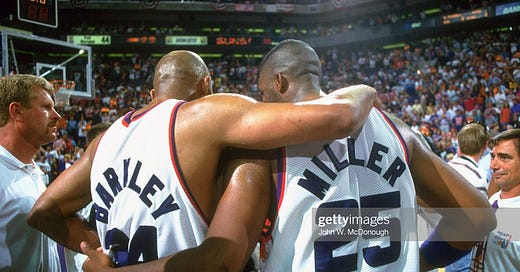


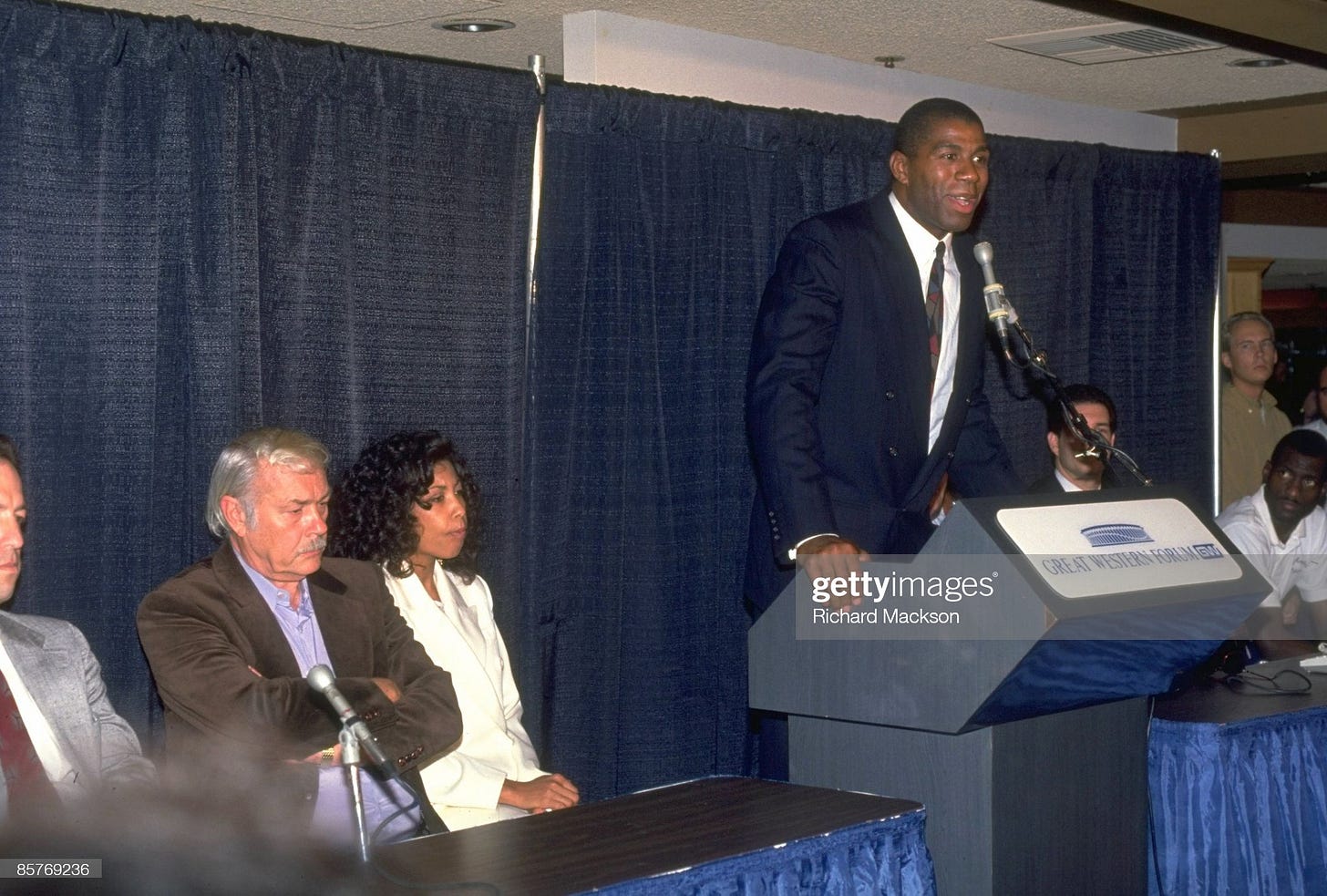

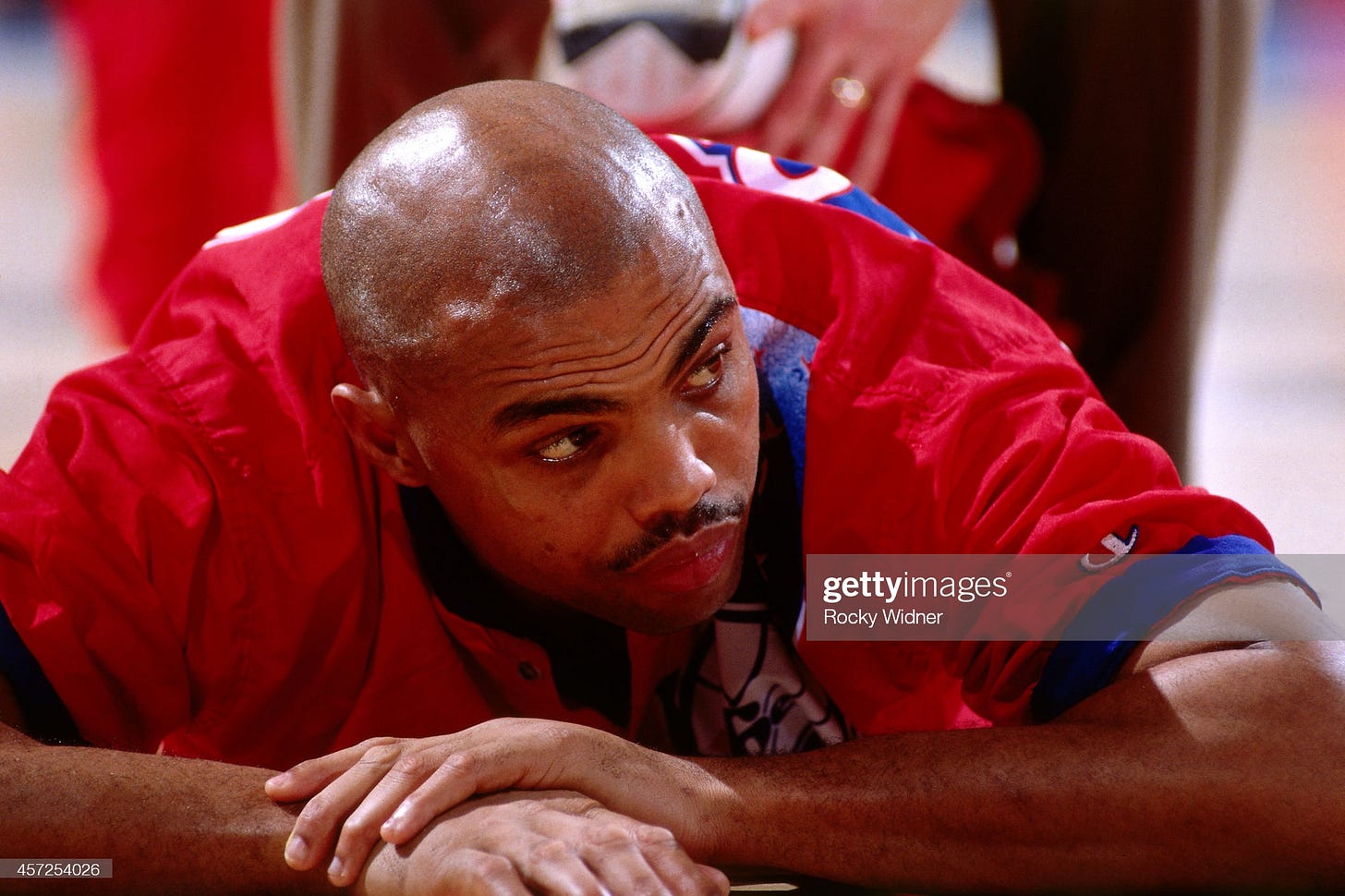



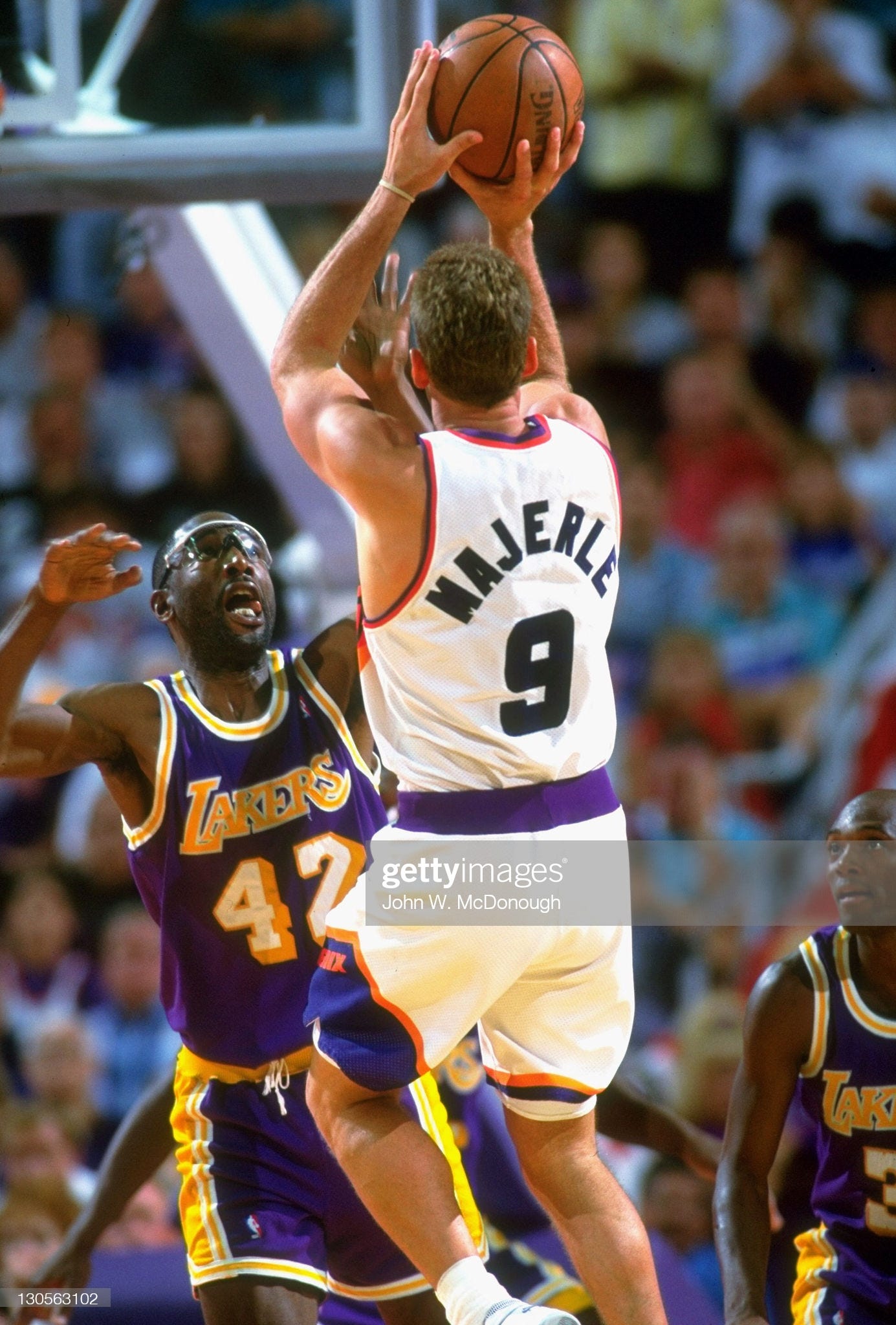
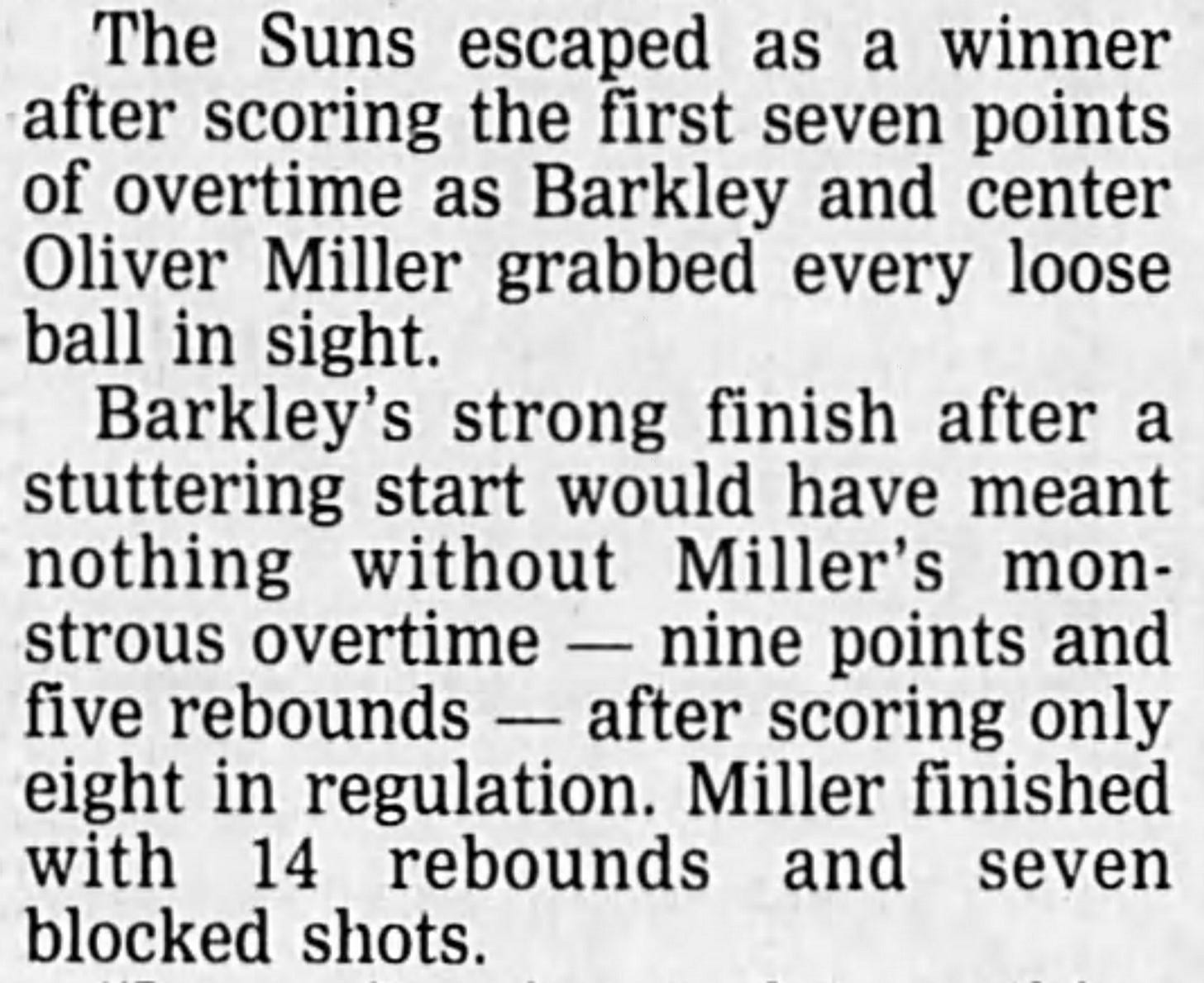
Great stuff! The early 1990s are a rare period where the Suns had the upper hand on the Lakers, upsetting them in the 1990 playoffs and managing to snag Barkley in 1992 after the Lakers almost acquired him.